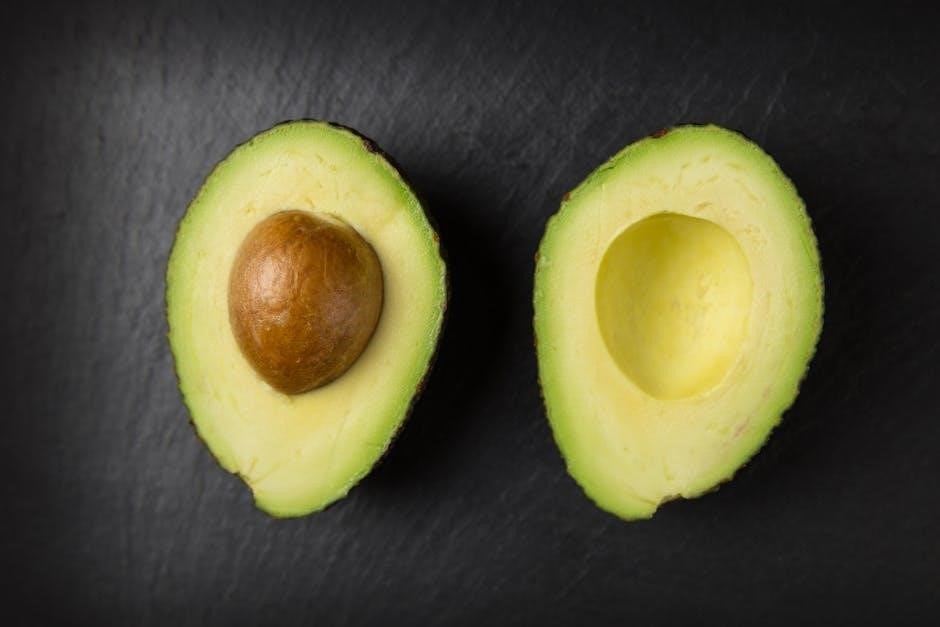Stomach ulcers are open sores in the stomach lining, often caused by H. pylori infection or NSAID use. A balanced diet rich in fiber, lean proteins, and probiotics can aid healing, while avoiding irritants like alcohol and spicy foods helps manage symptoms. This section explores the role of diet in understanding and managing stomach ulcers effectively.
1.1 What Are Stomach Ulcers and Their Causes
Stomach ulcers are open sores that develop in the lining of the stomach or upper part of the small intestine. They are often caused by infection with Helicobacter pylori (H. pylori) bacteria or long-term use of nonsteroidal anti-inflammatory drugs (NSAIDs). Factors like alcohol consumption, spicy or acidic foods, and stress can worsen symptoms. These ulcers can lead to pain, bloating, and complications if left untreated. Understanding the causes is crucial for effective management and prevention, often involving dietary adjustments and medical treatments tailored to address the underlying triggers.
1.2 The Role of Diet in Managing Stomach Ulcers
Diet plays a crucial role in managing stomach ulcers by promoting healing and reducing symptoms. A well-balanced diet helps protect the stomach lining, reduces acid production, and avoids irritants that can worsen ulcers. Foods high in fiber, lean proteins, and probiotics are beneficial, while alcohol, spicy, and fatty foods should be avoided. Proper hydration and portion control are also essential for digestion. By focusing on nutrient-rich, easily digestible foods, individuals can complement medical treatments and support their recovery. A tailored diet not only eases discomfort but also prevents future complications, emphasizing the importance of dietary adjustments for long-term health and well-being.

Foods to Eat for Stomach Ulcer Healing
A diet rich in high-fiber, lean proteins, and probiotic-rich foods supports stomach ulcer healing by reducing inflammation and promoting a healthy digestive system.
2.1 High-Fiber Foods: Their Benefits for Ulcer Patients
High-fiber foods play a crucial role in managing stomach ulcers by protecting the stomach lining and reducing acid damage. Foods like whole grains, berries, apples, broccoli, and leafy greens are rich in fiber, which helps soothe the digestive system. Fiber forms a protective barrier against stomach acid, minimizing irritation and promoting healing. Additionally, high-fiber foods are rich in antioxidants and polyphenols, which have antibacterial properties, particularly against H. pylori, a common cause of ulcers. Incorporating these foods into your diet can help alleviate symptoms, support gut health, and prevent further ulcer development.
2.2 Lean Proteins: Best Sources for Ulcer-Friendly Nutrition
Lean proteins are essential for ulcer patients as they provide necessary nutrients without irritating the stomach lining. Sources include skinless poultry, lean cuts of beef, fish, eggs, tofu, and legumes. These proteins are low in fat, reducing stomach acid production and promoting a gentle digestive process. Fatty fish like salmon and mackerel are also beneficial due to their omega-3 fatty acids, which reduce inflammation and support healing. Probiotic-rich options like Greek yogurt and kefir further aid gut health by maintaining a balanced microbiome. Incorporating these lean proteins into meals helps manage symptoms and supports overall recovery without exacerbating ulcer conditions.
2.3 Probiotic-Rich Foods: Supporting Gut Health
Probiotic-rich foods play a crucial role in maintaining a healthy gut microbiome, which is essential for managing stomach ulcers. Foods like yogurt, kefir, sauerkraut, kimchi, kombucha, and tempeh contain live cultures that promote beneficial bacteria in the stomach. These probiotics help reduce inflammation, improve digestion, and inhibit harmful bacteria like H. pylori, a common cause of ulcers. Incorporating these foods into your diet can aid in healing and prevent further irritation. They are gentle on the stomach and support overall digestive well-being, making them a key component of an ulcer-friendly diet. Including probiotic-rich foods in meals can enhance recovery and manage symptoms effectively.
2.4 Antimicrobial and Anti-Inflammatory Foods
Certain foods possess antimicrobial and anti-inflammatory properties, beneficial for managing stomach ulcers. Garlic contains compounds that combat H. pylori, while turmeric’s curcumin reduces inflammation. Ginger has natural anti-inflammatory effects, aiding digestion. Green tea is rich in polyphenols, which combat bacteria and protect the stomach lining. Cinnamon, cloves, and fennel also exhibit antimicrobial properties, helping inhibit harmful bacteria. Incorporating these foods into meals can support healing and prevent further irritation. Their mild flavors make them suitable for sensitive stomachs, enhancing recovery and overall gut health. These foods are valuable additions to an ulcer-friendly diet, promoting a balanced and restorative approach to managing symptoms effectively.

Foods and Substances to Avoid
Certain foods and substances can worsen stomach ulcers by irritating the lining or delaying healing. Alcohol, spicy, acidic, and fatty or fried foods should be avoided. These can increase stomach acid production and aggravate symptoms, hindering recovery. Processed foods and caffeine also contribute to discomfort. Eliminating these from the diet helps protect the stomach lining and supports the healing process, reducing pain and inflammation associated with ulcers. Avoiding trigger foods is crucial for managing symptoms effectively and preventing further complications.

3.1 Alcohol: Its Impact on Stomach Lining and Ulcer Healing
Alcohol is highly detrimental to stomach ulcer healing as it irritates the stomach lining, increasing acid production and delaying recovery. It erodes the protective mucous layer, making the stomach more susceptible to damage. Even small amounts of alcohol can worsen symptoms and prolong healing time. Beer, wine, and spirits all contribute to stomach irritation and should be avoided entirely. Alcohol consumption can also reduce the effectiveness of medications prescribed for ulcer treatment. To support healing and prevent further complications, complete abstinence from alcohol is essential for individuals with stomach ulcers.
3.2 Spicy and Acidic Foods: Why They Should Be Limited
Spicy and acidic foods can exacerbate stomach ulcer symptoms by irritating the stomach lining and increasing discomfort. Chili peppers, hot sauces, and acidic foods like citrus fruits and tomatoes can trigger acid reflux and worsen ulcer pain. While they may not cause ulcers, they can delay healing and increase irritation. Limiting or avoiding these foods helps reduce stomach acid production and alleviates symptoms. Opting for milder flavors and avoiding triggers can significantly improve comfort and support the healing process for individuals managing stomach ulcers.
3.3 Fried, Fatty, and Processed Foods: Their Role in Delaying Recovery
Fried, fatty, and processed foods can significantly delay stomach ulcer recovery by slowing digestion and increasing stomach acid production. These foods irritate the stomach lining, worsening discomfort and prolonging healing. Examples include fried foods like fries and processed meats, which are high in unhealthy fats. Red meat, if consumed in large amounts, can also trigger inflammation. While healthy fats like avocados and nuts are beneficial, fried and fatty foods should be avoided to prevent acid reflux and support ulcer healing. Limiting these foods helps reduce irritation and promotes a faster recovery process for individuals with stomach ulcers.

Additional Dietary Considerations
Portion control, meal frequency, and hydration are crucial. Eating smaller, frequent meals reduces acid production. Healthy fats like avocados and nuts support digestion without irritating the stomach lining.
4.1 Portion Control and Meal Frequency
Managing portion sizes and meal frequency is vital for stomach ulcer recovery. Eating smaller, more frequent meals throughout the day can help regulate stomach acid production and reduce irritation. Opting for 4-6 smaller meals instead of three large ones prevents overwhelming the digestive system. This approach minimizes acid spikes and allows the stomach lining to heal. Additionally, finishing meals at least three hours before bedtime helps prevent nighttime acid reflux. Pairing smaller portions with mindful eating, such as chewing thoroughly and avoiding rushed meals, further supports digestion and ulcer healing.
4.2 Healthy Fats and Their Role in Digestion
Healthy fats play a crucial role in digestion and ulcer healing. Foods like avocados, nuts, and olive oil provide essential fatty acids that support the stomach lining without triggering acid production. These fats aid in reducing inflammation and promoting a balanced gut environment, which is essential for healing. However, it’s important to avoid unhealthy fats found in fried and processed foods, as they can delay recovery. Incorporating the right types of fats ensures proper nutrient absorption and supports overall digestive health, making them a beneficial addition to an ulcer-friendly diet.
4.3 The Importance of Hydration
Staying hydrated is essential for digestion and overall health, especially for individuals with stomach ulcers. Water helps break down food, prevent acid buildup, and maintain a healthy stomach lining. Drinking plenty of water can reduce symptoms like heartburn and indigestion. Herbal teas, like chamomile or ginger tea, are also soothing options; Avoid caffeinated and carbonated beverages, as they can irritate the stomach lining. Proper hydration supports the healing process and ensures nutrients are effectively absorbed, promoting a faster recovery. Incorporating water-rich foods, such as cucumbers and watermelon, can also contribute to hydration levels while being gentle on the digestive system.
A well-rounded diet is crucial for managing and healing stomach ulcers. By focusing on high-fiber foods, lean proteins, and probiotic-rich options, individuals can support their digestive health. Avoiding irritants like alcohol, spicy foods, and fatty meals helps reduce discomfort and promotes healing. Incorporating antimicrobial and anti-inflammatory foods, along with staying hydrated, further enhances recovery. While diet plays a significant role, it should be complemented with medical treatments, such as antibiotics for H. pylori infections. A consistent and mindful approach to nutrition not only aids in ulcer healing but also prevents future occurrences, fostering long-term digestive wellness and overall health.